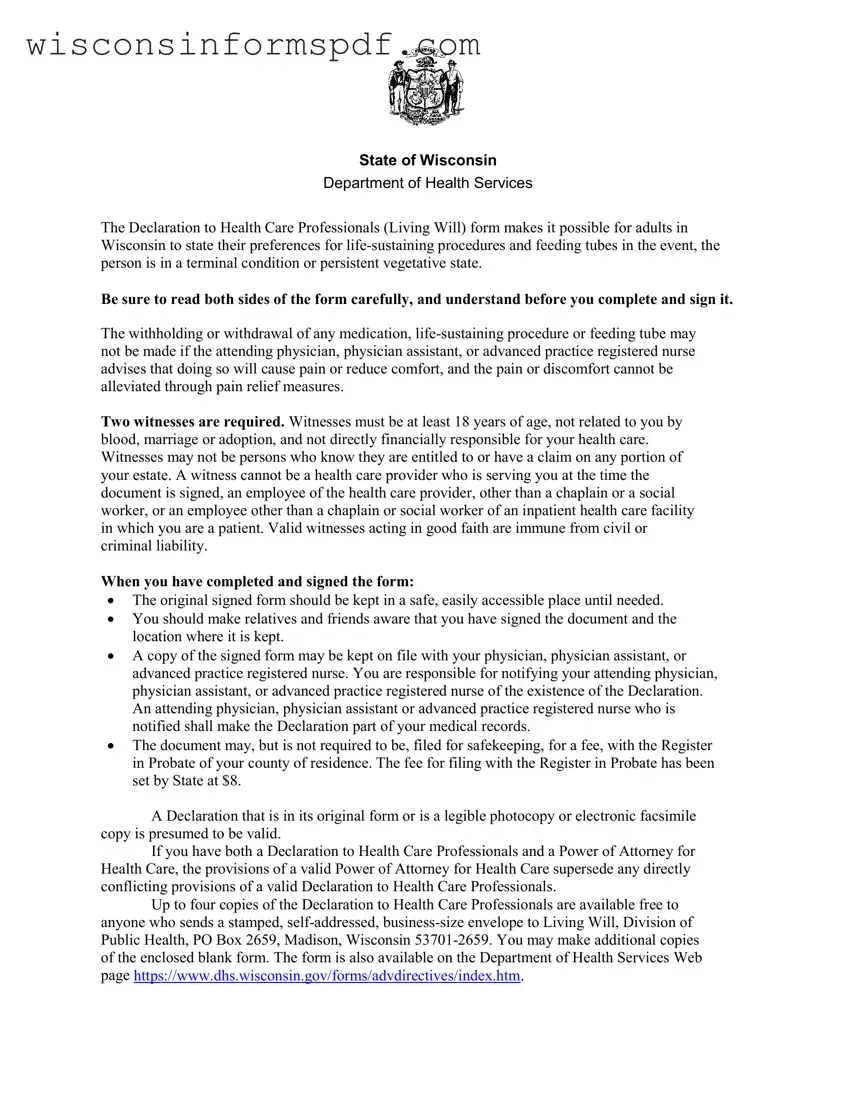State of Wisconsin
Department of Health Services
The Declaration to Health Care Professionals (Living Will) form makes it possible for adults in Wisconsin to state their preferences for life-sustaining procedures and feeding tubes in the event, the person is in a terminal condition or persistent vegetative state.
Be sure to read both sides of the form carefully, and understand before you complete and sign it.
The withholding or withdrawal of any medication, life-sustaining procedure or feeding tube may not be made if the attending physician, physician assistant, or advanced practice registered nurse advises that doing so will cause pain or reduce comfort, and the pain or discomfort cannot be alleviated through pain relief measures.
Two witnesses are required. Witnesses must be at least 18 years of age, not related to you by blood, marriage or adoption, and not directly financially responsible for your health care. Witnesses may not be persons who know they are entitled to or have a claim on any portion of your estate. A witness cannot be a health care provider who is serving you at the time the document is signed, an employee of the health care provider, other than a chaplain or a social worker, or an employee other than a chaplain or social worker of an inpatient health care facility in which you are a patient. Valid witnesses acting in good faith are immune from civil or criminal liability.
When you have completed and signed the form:
The original signed form should be kept in a safe, easily accessible place until needed.
You should make relatives and friends aware that you have signed the document and the location where it is kept.
A copy of the signed form may be kept on file with your physician, physician assistant, or advanced practice registered nurse. You are responsible for notifying your attending physician, physician assistant, or advanced practice registered nurse of the existence of the Declaration. An attending physician, physician assistant or advanced practice registered nurse who is notified shall make the Declaration part of your medical records.
The document may, but is not required to be, filed for safekeeping, for a fee, with the Register in Probate of your county of residence. The fee for filing with the Register in Probate has been set by State at $8.
A Declaration that is in its original form or is a legible photocopy or electronic facsimile copy is presumed to be valid.
If you have both a Declaration to Health Care Professionals and a Power of Attorney for Health Care, the provisions of a valid Power of Attorney for Health Care supersede any directly conflicting provisions of a valid Declaration to Health Care Professionals.
Up to four copies of the Declaration to Health Care Professionals are available free to anyone who sends a stamped, self-addressed, business-size envelope to Living Will, Division of Public Health, PO Box 2659, Madison, Wisconsin 53701-2659. You may make additional copies of the enclosed blank form. The form is also available on the Department of Health Services Web page https://www.dhs.wisconsin.gov/forms/advdirectives/index.htm.
INSTRUCTIONS FOR DECLARATION TO HEALTH CARE PROFESSIONALS FORM Definitions
“Declaration” means a written, witnessed document voluntarily executed by the declarant under State Statute (1), but is not limited in form or substance to that provided in State Statute 154.03(2).
“Department” means the Department of Health Services.
“Feeding tube” means a medical tube through which nutrition or hydration is administered into the vein, stomach, nose, mouth or other body opening of a qualified patient.
“Terminal condition” means an incurable condition caused by injury or illness that reasonable medical judgment finds would cause death imminently, so that the application of life-sustaining procedures serves only to postpone the moment of death.
“Persistent vegetative state” means a condition that reasonable, medical judgment finds constitutes complete and irreversible loss of all the functions of the cerebral cortex and results in a complete, chronic and irreversible cessation of all cognitive functioning and consciousness and a complete lack of behavioral responses that indicate cognitive functioning, although autonomic functions continue.
“Qualified patient” means a declarant who has been diagnosed, and certified in writing to be afflicted with a terminal condition or to be in a persistent vegetative state by two health care professionals and one of whom is a physician, who have personally examined the declarant.
“Attending health care professional” means a health care professional who has primary responsibility for the treatment and care of the patient.
“Advanced practice registered nurse” means a nurse licensed under ch. 154 who is currently certified by a national certifying body approved by the board of nursing as a nurse practitioner, certified midwife, certified registered nurse anesthetist, or clinical nurse specialist.
“Health care professional” means any of the following: a physician licensed under ch. 154, a physician assistant licensed under ch. 154, or an advanced practice registered nurse.
“Inpatient health care facility” has the meaning provided under State Statute 50.135(1) and includes community-based residential facilities as defined in State Statute 50.01(1g).
“Life-sustaining procedure” means any medical procedure or intervention that, in the judgment of the attending health care professional, would serve only to prolong the dying process but not avert death when applied to a qualified patient.
“Life-sustaining procedure” includes assistance in respiration, artificial maintenance of blood pressure and heart rate, blood transfusion, kidney dialysis and other similar procedures, but does not include (a) the alleviation of pain by administering medication or by performing a medical procedure; or (b) the provision of nutrition or hydration.
Procedures for Signing Declarations
A Declaration must be signed by the declarant in the presence of two witnesses. If the declarant is physically unable to sign a Declaration, the Declaration must be signed in the declarant’s name by one of the witnesses or some other person at the declarant’s express direction and in his or her presence; such a proxy signing shall either take place or be acknowledged by the declarant in the presence of two witnesses.
Effect of Declaration
The desires of a qualified patient who is competent supersede the effect of the Declaration at all times. If a qualified patient is incompetent at the time of the decision to withhold or withdraw life- sustaining procedures or feeding tubes, a Declaration executed under this chapter is presumed to be valid.
Revocation of Declaration
A Declaration may be revoked at any time by the declarant by any of the following methods:
1)By being canceled, defaced, obliterated, burned, torn or otherwise destroyed by the declarant or by some person who is directed by the declarant and who acts in the presence of the declarant.
2)By a written revocation, signed and dated by the declarant expressing the intent to revoke.
3)By a verbal expression by the declarant of his or her intent to revoke the Declaration, but only if the declarant or a person acting on behalf of the declarant notifies the attending physician, physician assistant, or advanced practice registered nurse of the revocation.
4)By executing a subsequent Declaration.
The attending physician, physician assistant, or advanced practice registered nurse shall record in the declarant’s medical records the time, date and place of the revocation and time, date and place, if different, that he or she was notified of the revocation.
Liabilities
No physician, physician assistant, or advanced practice registered nurse, inpatient health
care facility or health care professional acting under direction of a physician, physician assistant, or advanced practice registered nurse may be held criminally or civilly liable, or charged with unprofessional conduct of any of the following:
1)Participating in the withholding or withdrawal of life-sustaining procedures or feeding tubes under Ch. 154, subchapter II.
2)Failing to act upon a revocation unless the person or facility has actual knowledge of therevocation.
3)Failing to comply with a Declaration, except that failure by a physician, physician assistant, or advanced practice registered nurse to comply with a Declaration of a qualified patient constitutes unprofessional conduct if the physician, physician assistant, or advanced practice registered nurse refuses or fails to make a good faith attempt to transfer the patient to another physician, physician assistant, or advanced practice registered nurse who will comply with the Declaration.
F-00060A (Rev. 02/2020)
DEPARTMENT OF HEALTH SERVICES |
STATE OF WISCONSIN |
Division of Public Health |
Effective Date February 7, 2020 |
F-00060 (02/2020) Page 1 of 2 |
Wis. Stat. §154.03(1)(2) |
PLEASE BE SURE YOU READ THE FORM CAREFULLY AND UNDERSTAND IT
BEFORE YOU COMPLETE AND SIGN IT
DECLARATION TO HEALTH CARE PROFESSIONALS (WISCONSIN LIVING WILL)
I,
being of sound mind, voluntarily state my desire that my dying not be prolonged under the circumstances specified in this document. Under those circumstances, I direct that I be permitted to die naturally. If I am unable to give directions regarding the use of life-sustaining procedures or feeding tubes, I intend that my family and physician, physician assistant or advanced practice registered nurse, honor this document as the final expression of my legal right to refuse medical or surgical treatment.
1.If I have a TERMINAL CONDITION, as determined by a physician, physician assistant, or advanced practice registered nurse, who have personally examined me, and if a physician who has also personally examined me agrees with that determination, I do not want my dying to be artificially prolonged and I do not want life-sustaining procedures to be used. In addition, the following are my directions regarding the use of feeding tubes:
 YES, I want feeding tubes used if I have a terminal condition.
YES, I want feeding tubes used if I have a terminal condition.
 NO, I do not want feeding tubes used if I have a terminal condition. If you have not checked either box, feeding tubes will be used.
NO, I do not want feeding tubes used if I have a terminal condition. If you have not checked either box, feeding tubes will be used.
2.If I am in a PERSISTENT VEGETATIVE STATE, as determined by a physician, physician assistant, or advanced practice registered nurse who have personally examined me, and if a physician who has also personally examined me agrees with that determination, the following are my directions regarding the use of life-sustaining procedures:
 YES, I want life-sustaining procedures used if I am in a persistent vegetative state.
YES, I want life-sustaining procedures used if I am in a persistent vegetative state.
 NO, I do not want life-sustaining procedures used if I am in a persistent vegetative state. If you have not checked either box, life-sustaining procedures will be used.
NO, I do not want life-sustaining procedures used if I am in a persistent vegetative state. If you have not checked either box, life-sustaining procedures will be used.
3.If I am in a PERSISTENT VEGETATIVE STATE, as determined by a physician, physician assistant, or advanced practice registered nurse who has personally examined me, and if a physician who has also personally examined me agrees with that determination, the following are my directions regarding the use of feeding tubes:
 YES, I want feeding tubes used if I am in a persistent vegetative state.
YES, I want feeding tubes used if I am in a persistent vegetative state.
 NO, I do not want feeding tubes used if I am in a persistent vegetative state.
NO, I do not want feeding tubes used if I am in a persistent vegetative state.
If you have not checked either box, feeding tubes will be used.
If you are interested in more information about the significant terms used in this document, see section 154.01 of the Wisconsin Statutes or the information accompanying this document.
F-00060 (02/2020) Page 2 of 2
ATTENTION: You and the 2 witnesses must sign the document at the same time.
Signed |
Date |
Address |
Date of Birth |
I believe that the person signing this document is of sound mind. I am an adult and am not related to the person signing this document by blood, marriage or adoption. I am not entitled to and do not have a claim on any portion of the person's estate and am not otherwise restricted by law from being a witness.
Witness Signature_______________________________________Date Signed
Print Name
Witness Signature |
Date Signed |
Print Name
DIRECTIVES TO ATTENDING PHYSICIAN, PHYSICIAN ASSISTANT,
OR ADVANCED PRACTICE REGISTERED NURSE
1.This document authorizes the withholding or withdrawal of life-sustaining procedures or of feeding tubes when a physician and another physician, physician assistant, or advanced practice registered nurse, one of whom is the attending health care professional, have personally examined and certified in writing that the patient has a terminal condition or is in a persistent vegetative state.
2.The choices in this document were made by a competent adult. Under the law, the patient's stated desires must be followed unless you believe that withholding or withdrawing life- sustaining procedures or feeding tubes would cause the patient pain or reduced comfort and that the pain or discomfort cannot be alleviated through pain relief measures. If the patient's stated desires are that life-sustaining procedures or feeding tubes be used, this directive must be followed.
3.If you feel that you cannot comply with this document, you must make a good faith attempt to transfer the patient to another physician, physician assistant, or advanced practice registered nurse who will comply. Refusal or failure to make a good faith attempt to do so constitutes unprofessional conduct.
4.If you know that the patient is pregnant, this document has no effect during her pregnancy.
* * * * *
The person making this living will may use the following space to record the names of those individuals and health care providers to whom he or she has given copies of this document:




 YES, I want feeding tubes used if I have a terminal condition.
YES, I want feeding tubes used if I have a terminal condition. NO, I do not want feeding tubes used if I have a terminal condition. If you have not checked either box, feeding tubes will be used.
NO, I do not want feeding tubes used if I have a terminal condition. If you have not checked either box, feeding tubes will be used. YES, I want
YES, I want  NO, I do not want
NO, I do not want  YES, I want feeding tubes used if I am in a persistent vegetative state.
YES, I want feeding tubes used if I am in a persistent vegetative state. NO, I do not want feeding tubes used if I am in a persistent vegetative state.
NO, I do not want feeding tubes used if I am in a persistent vegetative state.